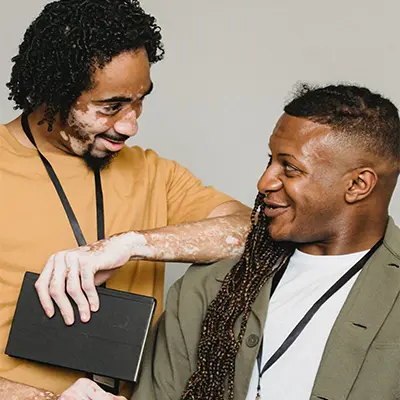- Email us : support@oceanemotiontherapy.com
- Call us : (201) 809 - 9094
Marriage counseling, Couples therapy or Relationship counseling
In couples or relationship counseling, each partnership is unique. In marriage, couples, or relationship counseling, a couple’s therapist will walk into your lives to facilitate individual and dyadic growth.
In couple’s therapy, the therapist and the two partners form a therapeutic alliance based on trust and care, a logical but also emotional bond to convey a safe place for the relationship to experience truth, respect, safety, love, and hope, whatever are the decisions made by the partners. Daily challenges are smoothly dealt with through the exploration of authenticity, improved communication, and negotiation skills.
Ocean Emotion Therapy will collaborate to develop a plan to meet your needs. We aim to provide an effective clinical thorough, specifically tailored to you, online telehealth experience. So that, you can attend our sessions and experience relational healing from the comfort of your house without adding the stress of the commute.

Why Ocean Emotion Therapy is best for Couple Therapy in Morris county?
Dealing with the stresses of daily life challenges, irritability, mood swings, psychological abuse, anger, depression and substance abuse, compulsive behaviors, and infidelity can put a strain on relationships. At Ocean Emotion Therapy, we believe in the importance of honest conversations. Our therapists can address these challenges head-on when both partners commit to the healing process. While your therapist may have recommendations, the decision for how long to continue with the couples therapy is up to the couple.
The relationships in couples therapy
Our couple therapists, who work remotely via phone and video conferencing, are inclusive, multiculturally competent, and from all possible diverse backgrounds. We work on a daily basis with:
Getting started with couples therapy
While many couples call us ready to get to work, there’s understandably a good deal of apprehension around getting started. Often one partner is more comfortable with the idea than the other. The biggest challenge is making the first session happen:
01
The initial contact (via phone/email)
In your initial contact, provide enough information to assess your interest and main goal in scheduling a session. Then, you will given some paperwork to fill out (e.g., consent for treatment) and some fast questionnaires to answer. It should not take you more than 15 to 20 minutes.
02
The first session
An open mind is the best way to engage in couple therapy and get a sense of the healing dynamics of the process.
03
Continuing therapy
Some couples may have to make some flexible, creative adjustments at work and over their childcare schedules. We will always offer many scheduling options as day and evening appointments may be needed.
How long will couples therapy take?
It depends on the goals of the partners who are coming to therapy. Some couples come to therapy to save the relationship by understanding its core problematic underlayers, while other couples come to therapy following their lawyer's recommendation to figure out if they want to smoothly depart from each other because they may, over the years, have outgrown each other. The time frame range can go from short-term to long-term when involving other issues (e.g., substance abuse) that may have to be treated in separate individual sessions.
The partners make all the pertinent decisions with the informed guidance of a therapist who enables a safe environment keeps the process authentic, efficient and, relationally fluid, and productive.

Most common worries for couple therapy in Morris County
Is it strange to seek couples therapy if we are not officially married?
No. A lot of couples we see for couples therapy are not married. Relationships are different and all the reasons for seeking help are unique.
We are not-killing-each-other-everyday but we need couple therapy.
Couple therapy will make it easier for the partners to learn to actively listen to the three selves of the relationship (the two individual selves and the relational self). The level of communication and understanding will significantly improve, which per se will improve the couple’s daily negotiation. This will enhance, trust, intimacy (vulnerability, physical intimacy (sex) and marital/family affection responses.
Is couple therapy a waste of time, if all we do is fight and resent each other?
Couple therapy is where both partners learn to actively listen to their selves, to the other’s self, and to the self of the relationship to connect. Therapists are specially trained to work with you in a safe therapeutic environment.

Frequently Asked Questions
Couples therapy supports you, your partner, and the couplehood. It facilitates resolving complex issues like infidelity, parenting, and financial/career decisions, keeping the relationship healthy. In individual therapy, only one person attends the session with the therapist. In family therapy, the family unit or part of it integrates the therapeutic alliance to understand and recreate the healthier family dynamics.
Couples therapy sessions are conducted online (via a video call/ phone call) every week. Your therapist will likely be a marriage and family therapist, a licensed mental health counselor, or a licensed social worker. They will have a license justifying their training in treating couples.
During your session, via dialogue, the therapeutic alliance (the therapist and the couple) identifies and develops goals to improve the relationship and reduce the quasi-compulsive conflict.
Couple Therapy is considered very effective, and plenty of recent empirical research justifies it from psychodynamic-inspired work (e.g., Emotional Focused Therapy) to cognitive-behavioral-inspired work (e.g., Gottman, narrative therapy and problem-solving approaches). It is fair to expect improvements in the relationship and individual growth.
Online therapy improves a couple’s communication, self- and other-understanding, and negotiation. Most separations and divorces occur not because people outgrew love but because of the endless repetition of miscommunication and consequent misunderstandings.
However, online couple therapy is not recommended in cases of domestic violence since the dialogue may escalate into violence; in this case, individual therapy is safer and more effective for both partners.









